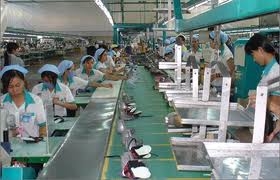Big struggle ahead to get local SMEs back on their feet
 Currently, more than 97 per cent of all enterprises in Vietnam are small- and medium-sized enterprises (SMEs) and they provide more than half the employment opportunities in the country.
Currently, more than 97 per cent of all enterprises in Vietnam are small- and medium-sized enterprises (SMEs) and they provide more than half the employment opportunities in the country.
However, by September 2012, over 51,000 enterprises were newly-established; 42,000 enterprises were dissolved and stopped operation, according to a recent report of Vietnam Chamber of Commerce and Industry (VCCI).
Meanwhile, a survey of Central Institute for Economic Management (CIEM) among 2,449 SMEs in the country’s 10 big cities and provinces in 2012 showed that nearly 39 per cent these enterprises were facing credit difficulties.
VCCI secretary general Pham Thi Thu Hang said that in recent years, the number of new businesses increased but the enterprise size was mainly small and very small, so it was very difficult to approach and expand markets.
Le Thi Hong Len, head of the Association of Chartered Certified Accountants (ACCA), Vietnam said the SME sector was a critical one to the future success of the Vietnam economy.
Currently, SMEs contribute approximately 25 per cent to Vietnam’s total export earnings, 40 per cent to GDP, 30 per cent to the state budget, and 35 per cent to the country’s total social investment.
In the next three years, the SMEs are expected to create between 3.5 million and 4 million news jobs, fulfilling more than 65 per cent of Vietnam’s new employment.
“Small businesses, because they can act quickly, will also lead the development of the Vietnam economy,” Len said. “But they face a number of challenges, including how to access finance.”
Rosana Mirkovic, head of SME Policy at ACCA, said: “Small businesses around the world all face the similar challenges – such as regulation, access to finance and access to cross border trade.
Supporting SME development ought to be an active agenda across government departments.”
For example, she added, those departments responsible for fiscal policy, justice or employment law may well have a bigger effect on SME growth and access to finance – through their decisions on tax policy on equity funding, setting up or developing better access to efficient credit information facilities right through to well-functioning property and contract law frameworks.
The MPI has proposed eight groups of measures to boost SME development in the 2011-2015 period. They include completing the legislative framework regulating SME operations, providing financial assistance and preferential credit loans, promoting the application of technology, developing human resources, updating market information, expanding markets, building business support agencies, and furthering business management skills.
Le Manh Hung, deputy head of the Business Development Department under the Ministry of Planning and Investment, said SME support funds should be created, with high technology developments prioritised, and SME innovation encouraged — all aiming to increase added-value, competitiveness, and protect the environment.
For SMEs to overcome this difficulty, VCCI’s Huong said the enterprises should review the whole system of production, distribution, product innovation, innovative technology applications to further participate in the global value chain, exploit the domestic market and enter niche markets.
At the same time, enterprises should closely involve in the cluster system, industrial zones, and collaborate with other business associations to improve product quality at reasonable prices.
What the stars mean:
★ Poor ★ ★ Promising ★★★ Good ★★★★ Very good ★★★★★ Exceptional
 Tag:
Tag:
Related Contents
Latest News
More News
- Hermes joins Long Thanh cargo terminal development (February 04, 2026 | 15:59)
- SCG enhances production and distribution in Vietnam (February 04, 2026 | 08:00)
- UNIVACCO strengthens Asia expansion with Vietnam facility (February 03, 2026 | 08:00)
- Cai Mep Ha Port project wins approval with $1.95bn investment (February 02, 2026 | 16:17)
- Repositioning Vietnam in Asia’s manufacturing race (February 02, 2026 | 16:00)
- Manufacturing growth remains solid in early 2026 (February 02, 2026 | 15:28)
- Navigating venture capital trends across the continent (February 02, 2026 | 14:00)
- Motivations to achieve high growth (February 02, 2026 | 11:00)
- Capacity and regulations among British areas of expertise in IFCs (February 02, 2026 | 09:09)
- Transition underway in German investment across Vietnam (February 02, 2026 | 08:00)




















 Mobile Version
Mobile Version